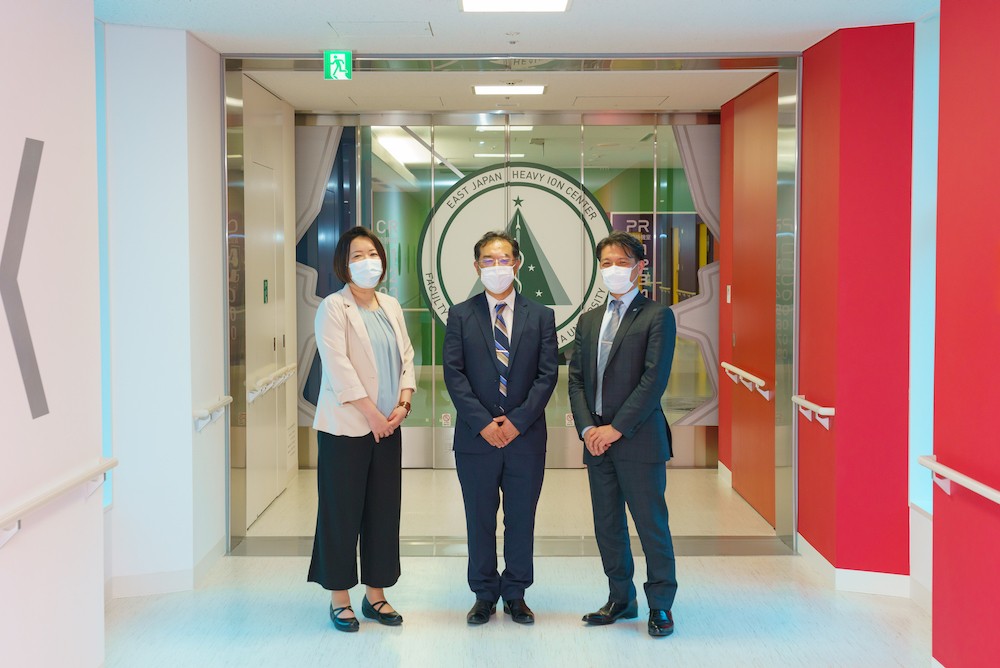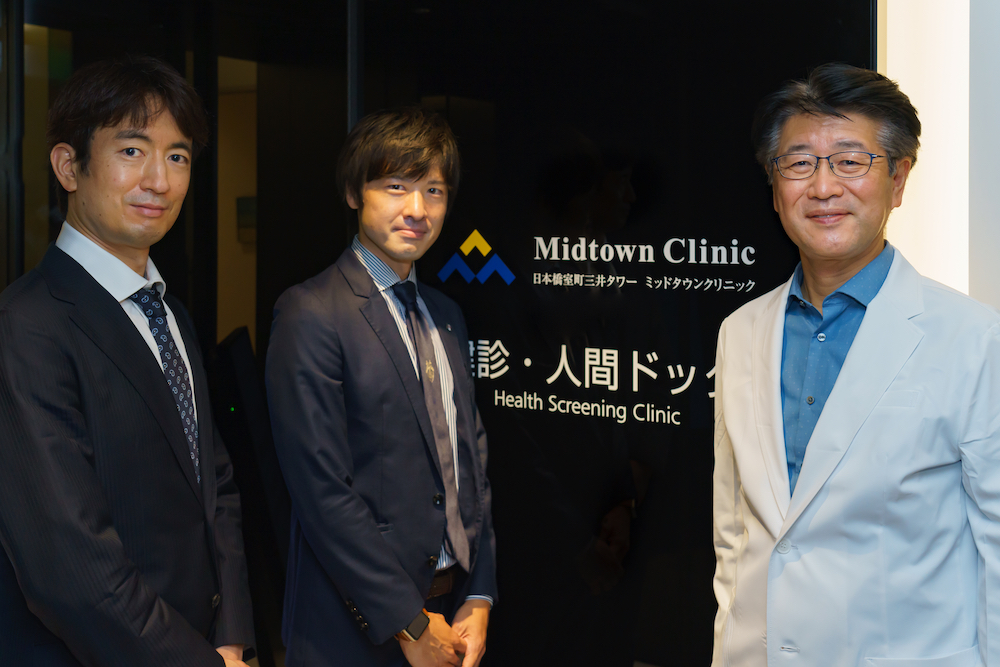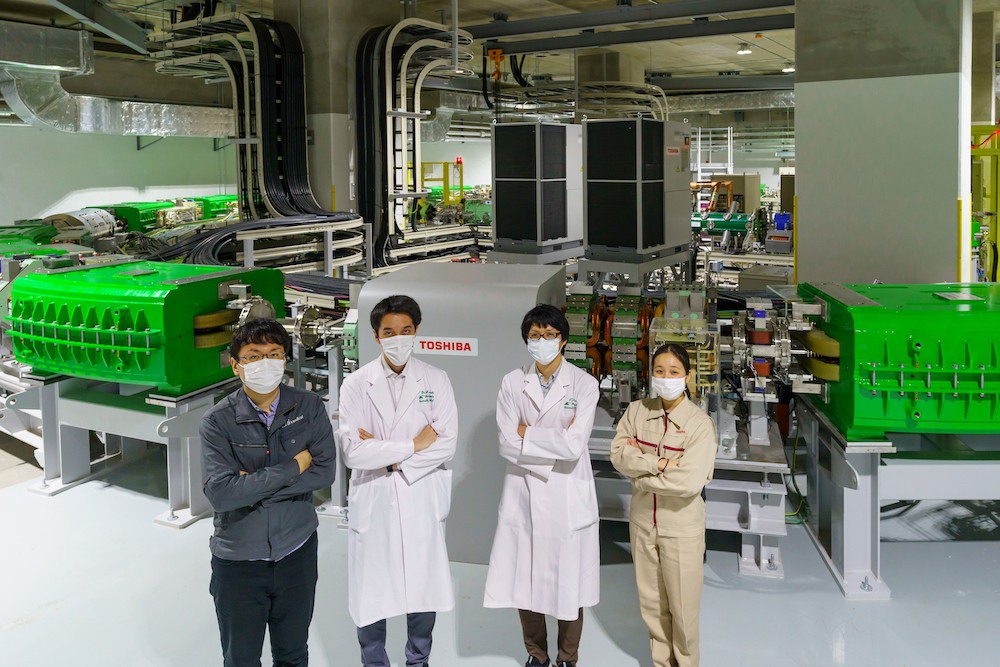Co-Creation, Not Competition: Harnessing Genomic Information for Healthcare
2023/11/22 Toshiba Clip Team
- Why did DeNA Life Science and Toshiba choose each other?
- Offering new value through the practical application of genomic information
- From competition to co-creation: a vision of the future from two perspectives
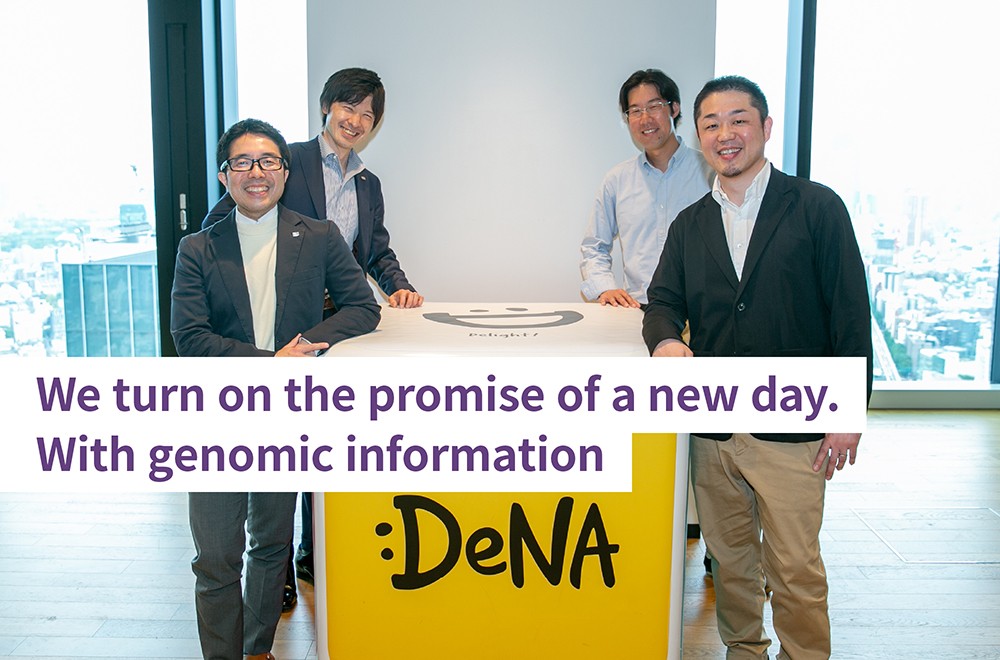
As we enter an era of 100-year life expectancies, one of the most important considerations will be extending healthy life expectancy —the length of time a person can live without being limited in their daily lives by illness or other ailments. It is here that health data comes into play. If we can harness everyone’s distinct health data and tailor healthcare to their needs accordingly, this will allow us to increase healthy life expectancy. This data includes genomic information. “Genome” refers to genetic information in its entirety and is a compound word derived from “gene” and “chromosome”.
While genomes are the subject of various studies in relation to their important role in life events and diseases, they can also be regarded as the ultimate in personal information. So, how should we approach the handling of this type of data? According to the Japan National Museum of Emerging Science and Innovation’s Survey on the Use of Genomic Information*1, answers to the question “How would you like genomic information to be used in medicine and research?” include not only those relating to personal health, such as “choosing methods of medical treatment,” but also those relating to contributing to the future and society, such as “for future generations” and “for my descendants.”
*1 Committee on Science and Technology of Health Sciences Council, Expert Committee on the Promotion of Whole Genome Analysis, etc. (7th Meeting) (Ref. 11)
DeNA Life Science and Toshiba have joined forces with the aim of putting genomic information to practical use, thereby improving the quality of life (QOL*2) for every individual and contributing to the next generation of healthcare. The two companies have started exploring collaboration in the application of health data, including genomic information. DeNA, with its strength in the entertainment sector, and Toshiba, with its manufacturing expertise; why did these two seemingly dissimilar companies choose each other, share a common vision, and engage in in-depth discussions? We interviewed the people involved about the current situation and what the future holds.
*2 Quality in all areas of life, from the physical to the mental, social, and economic
Harnessing genomic information for healthcare
Toshiba, engaged in manufacturing for about 150 years, has provided products and services that contribute to a sustainable society in a wide range of areas, including energy systems like solar power generation, infrastructure such as water supply and sewage systems, semiconductors, and digital technologies such as AI. With Japan’s rapidly aging population, medical care and health are now social issues that are attracting attention worldwide. To address these issues, Toshiba has been conducting research and business development in the area of precision medicine by drawing on the capabilities it has amassed over the years in manufacturing and data. These efforts are guided by a vision of 1) helping to improve every individual’s QOL, 2) supporting advanced medicine and healthcare through our accrued technologies and new partnerships, and 3) harnessing the power of digital technology for next-generation preventive medicine.
This vision covers a wide range of areas, including prevention, screening, diagnosis, treatment, and prognosis, and the technologies to be employed are as diverse as AI and superconductivity. However, the common thread that unites them is the application of health data. To improve the QOL and healthy life expectancy of each individual, Toshiba aims to deliver individually-tailored medical care in prevention, screening, diagnosis, treatment, and prognosis by applying and combining fundamental technologies and the data they produce.
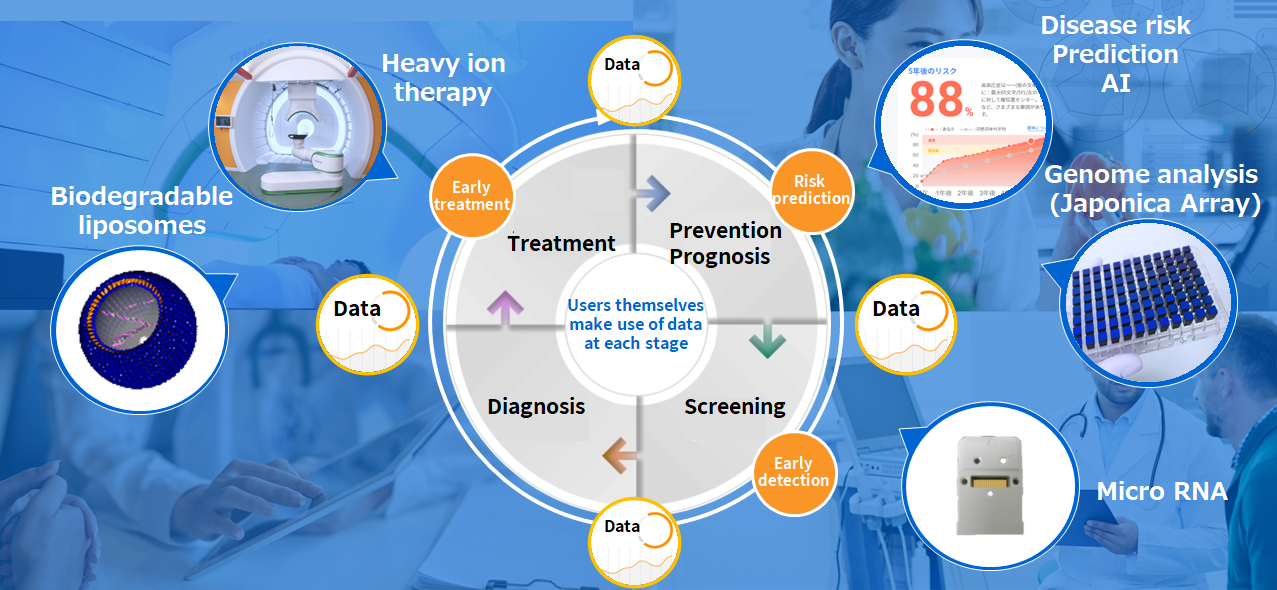
Toshiba is aiming to deliver individually-tailored medical care through the cyclical application of health data
Essential to this effort is genomic information, which can be described as the blueprint of each individual’s body. Taihei Yamaguchi from Toshiba’s Life Science Promotion Office gave us the following details about the company’s efforts in genomic information and its collaboration with DeNA Life Science, including some of the initiatives the company has undertaken to date.
“In Japan, a country where people often work many years for a single company, their health checkup data, medical interview data, and receipt data (medication information) may be retained for an extended period. We thought that if we could combine this with genomic information, we could make progress in understanding the mechanisms of disease and how to prevent it, thereby helping to realize part of our vision: next-generation preventive medicine.
Toshiba employees who agree with this vision and its initiatives provide data with their consent, which we then aggregate and analyze. We are also conducting joint research with academic institutions using genomic information, and are now exploring ways to share the benefits of the results we obtain with our employees and society at large. For example, we are conducting R&D on using AI to calculate disease risk based on health checkups and genomic information.
However, to expand our efforts and help realize our vision sooner, we need to conduct research incorporating a greater volume of genomic information and to collaborate with partners for its implementation in society. As such, believing that DeNA Life Science might share our vision and accelerate our efforts to realize it, we began to explore the possibility of a collaboration.”
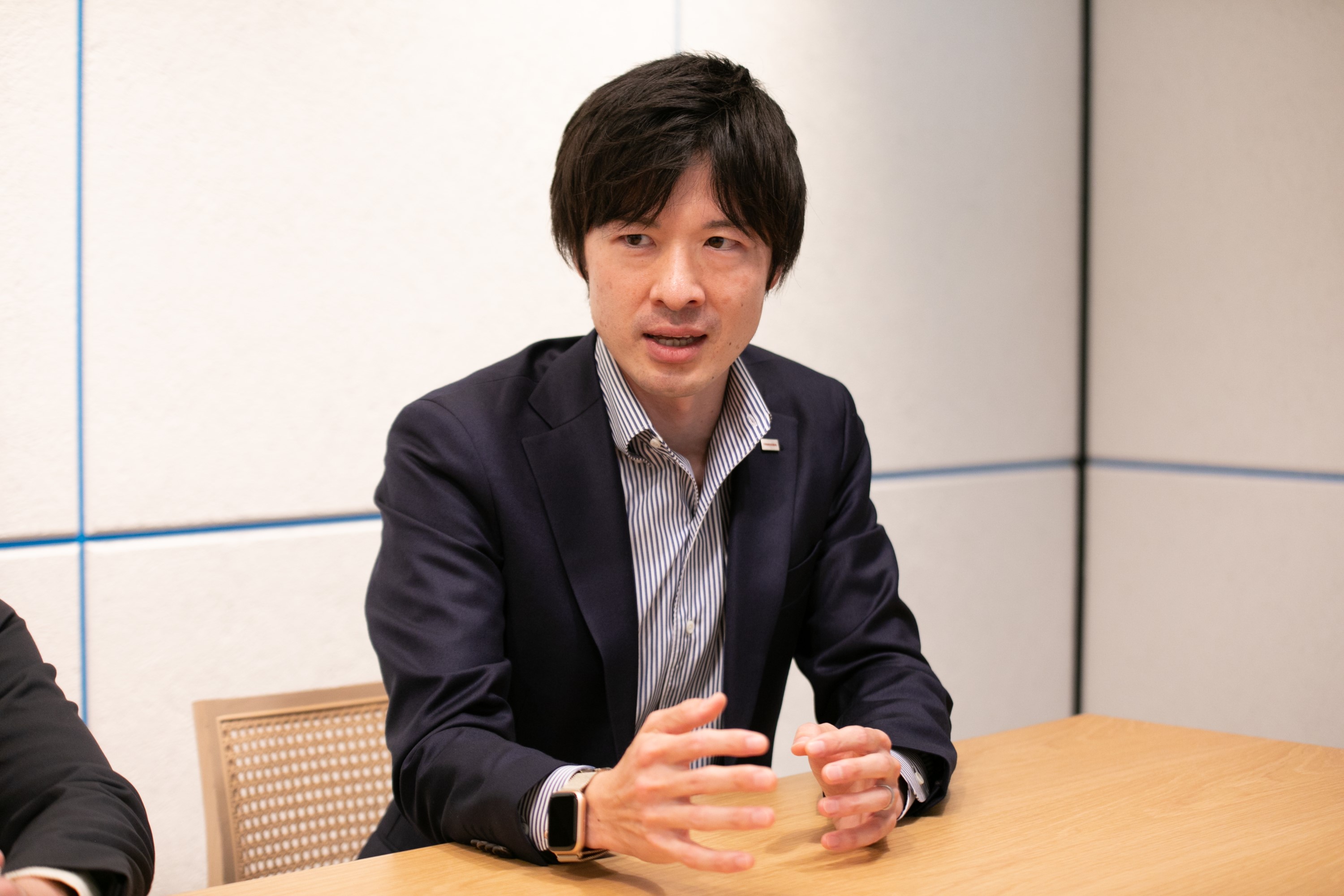
Taihei Yamaguchi, Expert in the Life Science Promotion Office, Corporate Technology Planning Division, Toshiba Corporation
DeNA, Toshiba’s partner in these efforts, is an entertainment company. However, it also has a proven track record in the fields of medicine and healthcare, centered on the MYCODE genetic testing service. So far, about 120,000 people have used the service, which uses saliva sampling to determine genetic tendencies such as susceptibility to disease and physical disposition. After purchasing a test kit, users check the results of their genetic test online.
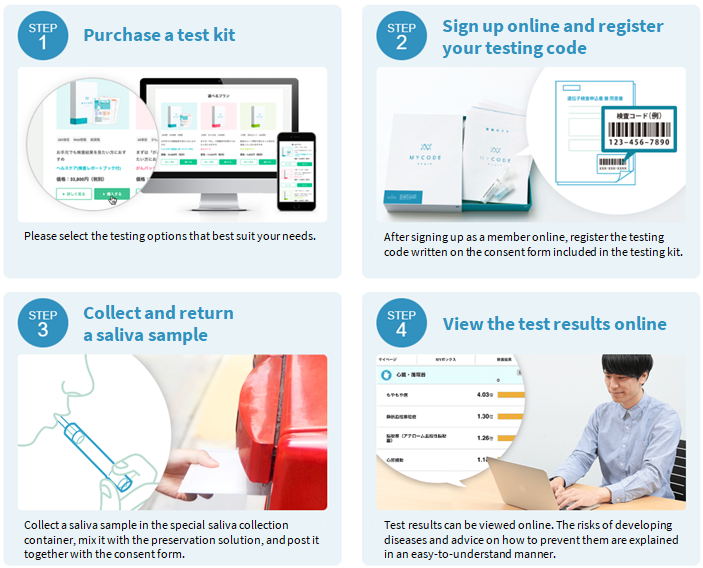
Summary of the MYCODE service
Of the approximately 120,000 people who have used MYCODE, around 90% have consented to the use of their data for research purposes. With this valuable data, we envision creating new value that will lead to improvements in people’s QOL. “It is rare to be able to collect genomic information on more than 100,000 people, and we will be able to create unprecedented value from this data,” confidently states Shingo Sunada, President of DeNA Life Science.
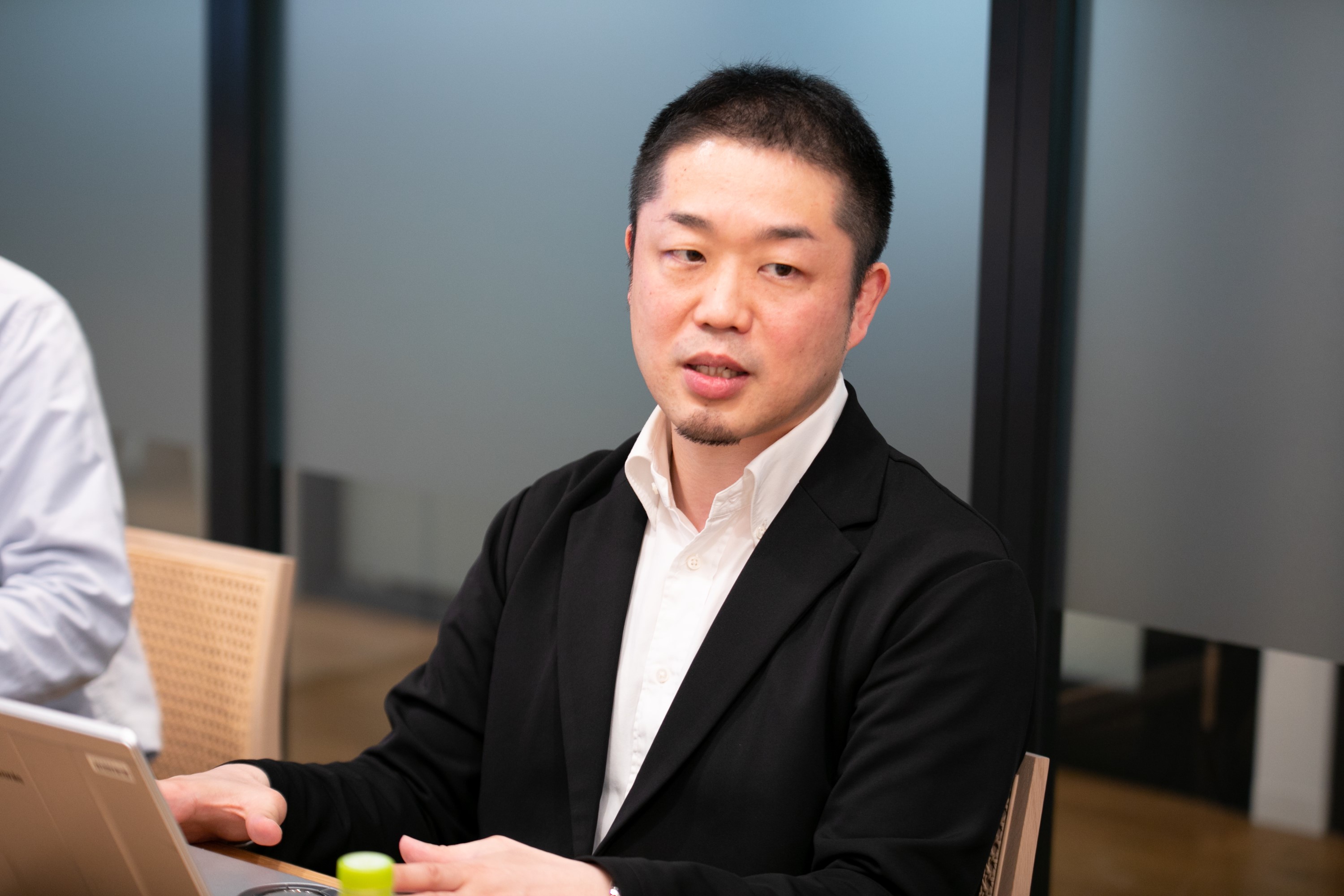
Shingo Sunada, President and Representative Director, DeNA Life Science, Inc.
Then, Kuno Suzuki, Director of the Genome Analysis Center at DeNA Life Science, thoroughly explained the collaboration with Toshiba. This gave us a glimpse of the aspects of improving healthcare, and ultimately QOL, that are difficult to achieve with a single company and limited data.
“DeNA Life Science’s data is valuable one entrusted to us by people who are willing to spend money to learn about their own genetic risks and dispositions, and who agree to the use of their data. We are now putting this information to use in several joint research projects with food, cosmetics manufacturers, and academic institutions, to share the value of genomic information with society.
The piece of the data we have represents a single point in time, measured by the users themselves. Based on various collaborative studies, in order to derive maximum benefits from research results and improve the QOL of individuals, there is a need for analysis that combines a greater variety of information, including genomic information, health information, and lifestyle data. Toshiba’s health data, taken on an ongoing basis over the years and linked to genomic information, is exactly what we have been looking for. Furthermore, we believe that by taking advantage of the electronics technology that Toshiba has developed through its manufacturing, it will be possible to acquire types of health data that have never been available. We expect new avenues of research to open up as the data become more precise.”
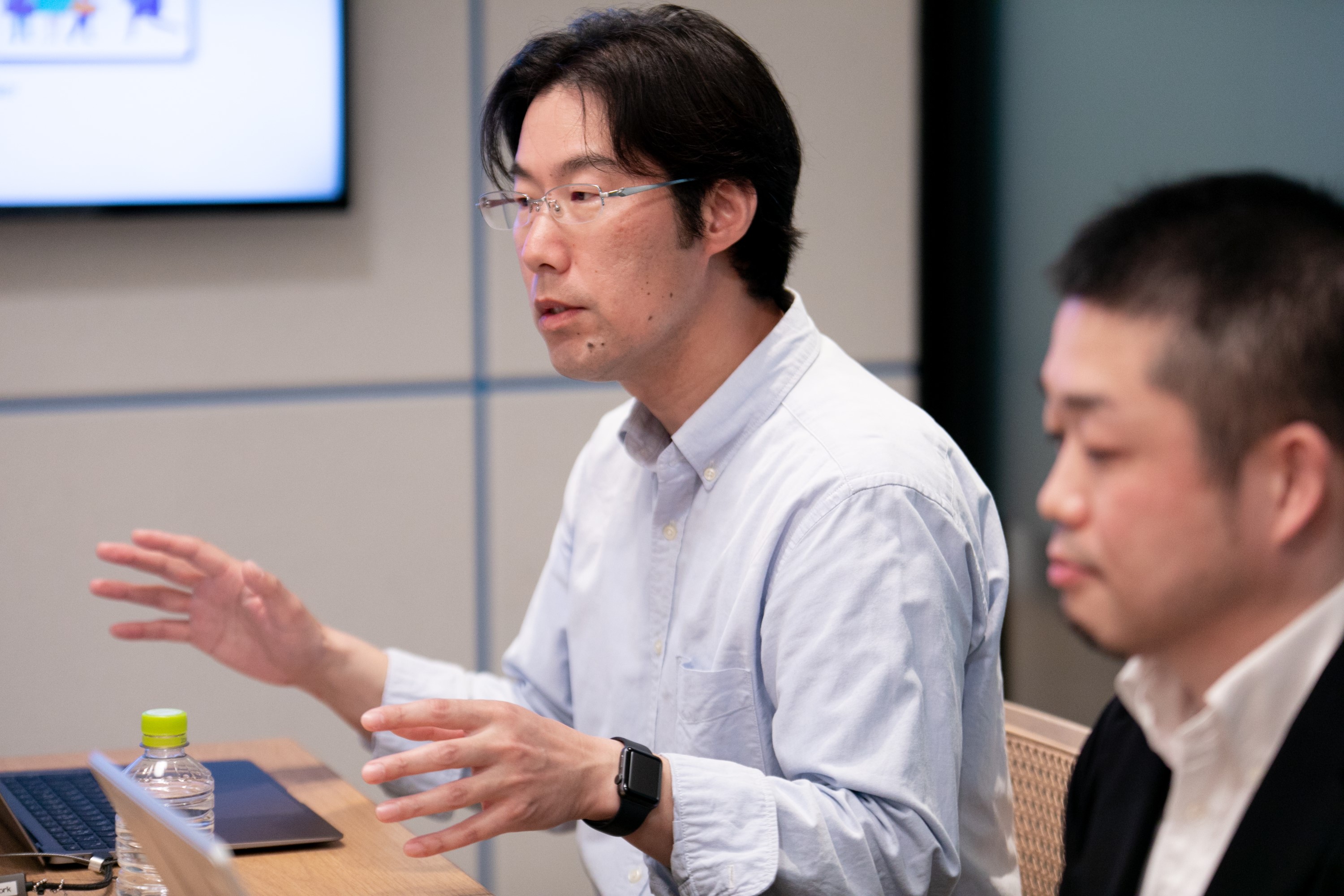
Kuno Suzuki, Director, Genome Analysis Center, MYCODE Service Department, DeNA Life Science, Inc.
Create new markets together
Although both DeNA Life Science and Toshiba could have generated sufficient value from their own data alone, the companies needed each other to achieve early implementation of solutions aimed at improving healthcare and enhancing people’s QOL. Although competitors in terms of harnessing genomic information, when thinking about fundamentals, their collaboration has the potential to create a new and meaningful market. Regarding the first step in applying data from the two companies, DeNA Life Science and Toshiba are exploring the following four business areas.
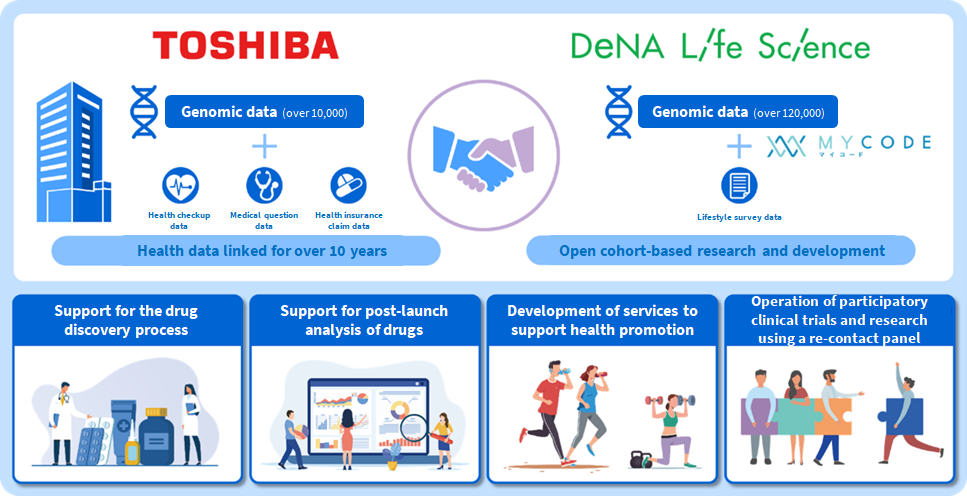
Collaborative businesses using genomic information envisioned by DeNA Life Science and Toshiba
■ Support for the drug discovery process:
Find people with unique genetic profiles to facilitate the development of new drugs tailored to specific types of disease. Investigate the possibility of using data to find new applications for existing drugs.
■ Support for post-launch analysis of drugs:
Identify mechanisms for the onset of side effects, complications, etc., and individual differences when drugs are used. Investigate the potential for data application with a view to multidimensional data analysis.
■Development of services to support health promotion:
Combine and analyze various types of data to build a behavioral change program to prevent lifestyle-related diseases such as diabetes and cardiovascular disease.
■ Operation of participatory clinical trials and research using a re-contact panel:
Obtain consent for participation in research from database participants and undertake clinical research for food, cosmetics, pharmaceutical, and other companies to recruit subjects and collect data.
Masashi Ebisawa, who is on the front line of business development at Toshiba, expressed his high expectations for these kinds of collaborative efforts, saying, “In fact, in terms of data volume, there were several other candidates we considered partnering with.
However, although those companies expressed their willingness to use data in basic research, there were some areas where it took a lot of work to see how they used the information obtained and presented and returned it to users.
Conversely, DeNA Life Science has published its research results in the form of MYCODE Research, which we felt matched our vision in terms of ‘giving value back to the public.’ Few companies like us are working toward social implementation and clearly state so on their websites. It’s very rewarding to be involved in creating businesses that will bring value to the next generation.”
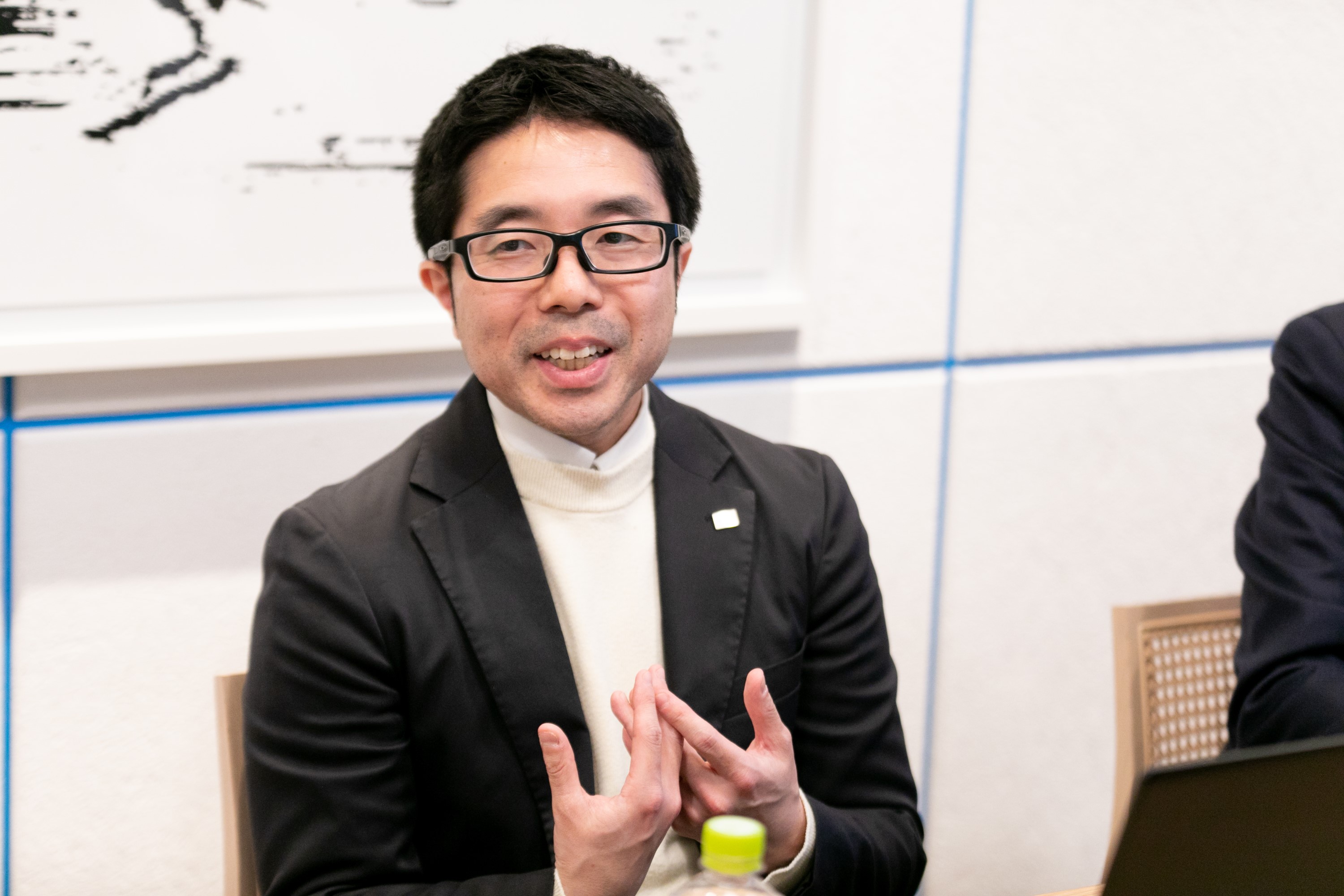
Masashi Ebisawa, Specialist in the Life Science Promotion Office, Corporate Technology Planning Division, Toshiba Corporation
If people could use genomic information to understand their personal condition, they may be able to adjust their behavior in a healthier direction, and their quality of life will improve. When that happens, there will be a variety of options suited for everyone, including physician treatment, solutions by companies, and more. So, what kind of vision for the future do the two companies hold, and what kind of initiatives are they pursuing now to make this society a reality?
Co-creation, not competition, is the future of healthcare
Let’s start with DeNA Life Science. Shingo Sunada, the company’s President, is focusing on advancing collaborative studies and seeing how quickly they can be brought to the practical stage. The key here is the concept of “community-derived science.” Mr. Sunada broke this down into simple terms for us.
“Our immediate goal is to define what value the two companies will give back to society and to achieve it quickly. DeNA Life Science specializes in ‘community-derived science,’ or creating communities where users volunteer to provide their own data to participate in research and development. By taking this approach, we as a company can discover new value and research outcomes, return them to society and the users through our services.
The world will change if, for example, Toshiba’s technology for predicting the future with AI is incorporated into the process. This will allow people to find the correct answers in their own data — that is, enabling them to ask what they should do or to choose what to use. I’m already excited about it.”
As mentioned earlier, Toshiba aims to provide individually-tailored medical care through the cyclical application of health data. The collaboration with DeNA Life Science will accelerate its progress. However, there are inherent joys and difficulties in developing the necessary technologies and services, and getting them accepted by society. Mr. Yamaguchi speaks passionately about this from his original perspective as an engineer.
“Combining genetic information with long-term health monitoring data and medication information will not only improve the accuracy of AI in predicting the risk of disease, but also enable the development of preventive methods that are optimized for specific individuals. We believe that the expertise that DeNA has cultivated in areas such as sports and games is essential for linking this prevention to behavioral change. They will have perspectives that Toshiba does not have, such as on how to change people’s behavior..
However, we will proceed cautiously with the development of technology and services. The time will soon come when genetic information is used for personal medical care. With that said, genetic information is highly sensitive as the ultimate personal information, so we must combine this development with consideration of privacy protection and security technologies. To make our vision a reality, we will work with various partners to find a balance between the use and safety of genetic information.”
Co-creation instead of competition. By drawing on their respective strengths, DeNA Life Science and Toshiba are working to turn on the promise of a new day with genomic information. As they combine their respective strength to advance projects, we will find healthcare that is meaningful not only for us, but also for future generations.
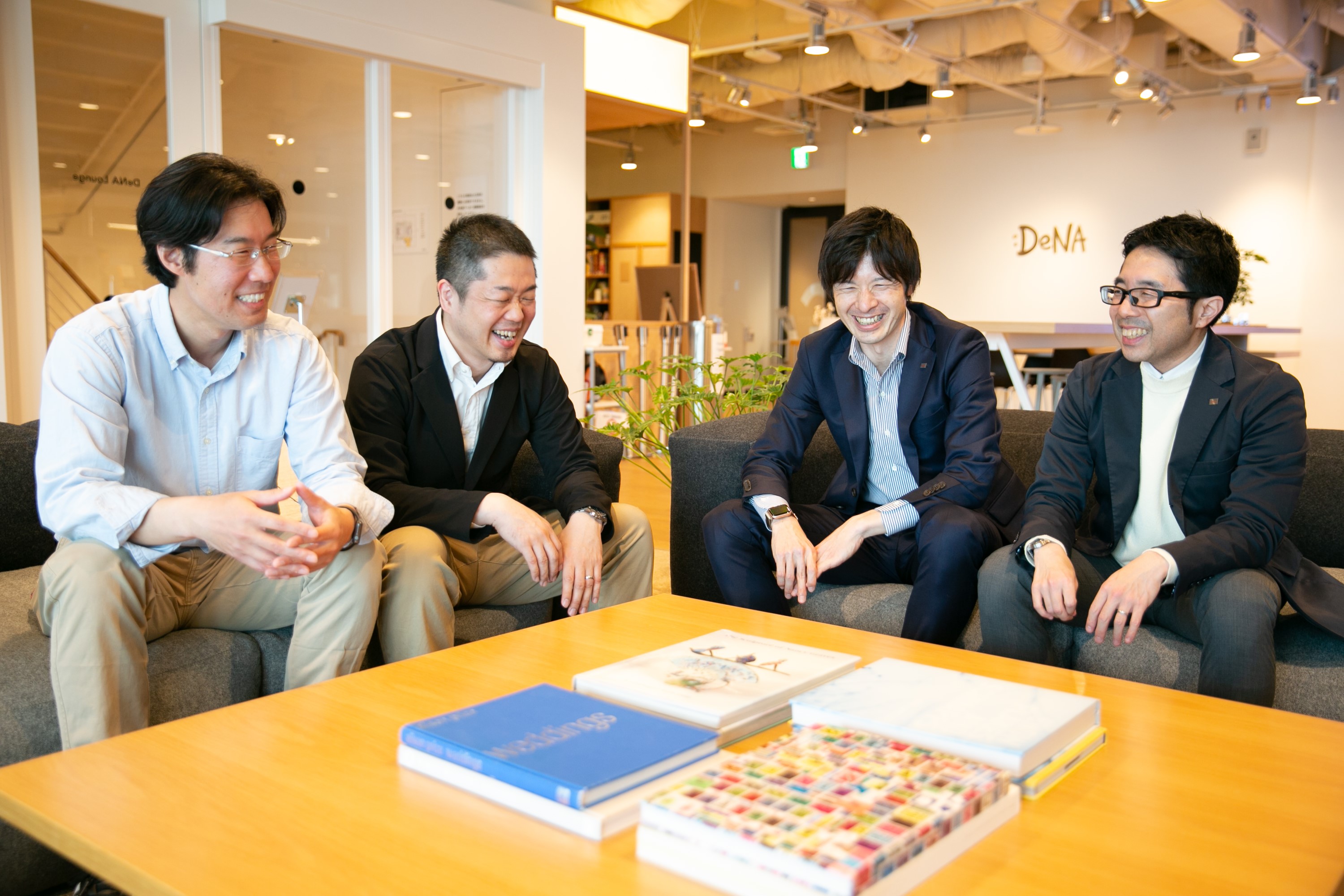
![]()





